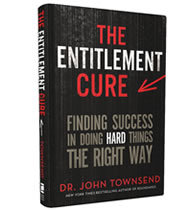Henry Cloud's Blog, page 20
November 4, 2015
Dr. Henry Cloud and Dave Ramsey Talk about Boundaries
Dr. Henry Cloud visits The Dave Ramsey Show as a guest to talk about one of Dave’s all-time favorite books, The New York Times bestseller Boundaries. In this video, part one of a two-part series, Dr. Cloud and Dave talk about the definition of boundaries, taking responsibility, boundaries in specific financial situations, boundaries in leadership situations, and more.
Watch Part 2 of this insightful discussion with Dr. Henry Cloud and Dave Ramsey.
Learn More about The New York Times bestselling book Boundaries by Drs. Henry Cloud and John Townsend.
The post Dr. Henry Cloud and Dave Ramsey Talk about Boundaries appeared first on Boundaries Books.
October 29, 2015
Help Your Children Develop a Balanced View of Themselves and Others
 When children come into the world, they are confused about the nature of their relationships. They do not think they are dealing with one person. In their minds, there are two mommies, not one. Or, two daddies, not one. There is the “good” mommy and the “bad” one.
When children come into the world, they are confused about the nature of their relationships. They do not think they are dealing with one person. In their minds, there are two mommies, not one. Or, two daddies, not one. There is the “good” mommy and the “bad” one.
The good one is the one who gratifies them. When they are hungry or needy, they protest, and the good mommy comes and relieves their stress. When they are gratified, they see this mommy as “good.” But if something they want is not forthcoming and Mommy frustrates their wish, she is seen as the “bad” mommy. You may even remember this literally happening. It is not unusual for a child to hear “no” and say, “Bad Mommy.” This split is universal.
Some adults have still not resolved this problem. If you do what they want, they are very loving and see you as a good person. But if you say “no” to them, they see you as bad for not giving them what they wanted. Then when you gratify them, you are seen as good all over again.
The other side of this is what goes on inside children. When they are getting what they want, they see themselves as entitled to what they are receiving; when they are being frustrated, they see themselves as victims of the “bad mom.” So not only do they see two mommies, but they also experience two selves as well: the entitled self and the deprived self. You can probably remember seeing this in very young children. When happy, they are very happy. When angry or sad, they are very angry or sad.
But as children experience both having their needs met and being frustrated with limits, they slowly merge the two images of themselves and others. They slowly realize a few extremely important things:
My needs are consistently responded to.
Not all my needs and wants are gratified.
The same person is both giving to me at some times and depriving me at other times—the one I love is the one I hate.
I am fortunate at times, and at other times I have to deal with being frustrated.
As this combination of gratification and frustration occurs a few million times, children gain a secure sense of the world’s being “not perfect” in gratifying them all the time, but “good enough” in giving them what they need. They slowly give up their wish for the “all-good other” who is going to meet all their needs perfectly and learn to love the one who both loves them and frustrates them. And they decide people are not perfect, but good enough. Children endure enough frustration to become grateful for what they receive as they find out they are not entitled to everything they want
To accomplish this task, children need two important things from you: gratification and frustration. Children who are never gratified are in a constant state of need, and they will never feel grateful because they literally have not gotten enough. This is the danger of parenting systems that overemphasize depriving the child early in life for fear that the child will control the home. Children must have their needs met to develop trust and gratitude. As the Bible says about us and our Father in heaven, “We love because he first loved us” (see 1 John 4:19). We need to be given to first.
But children who are never frustrated never understand that they are not the center of the universe, that they are not owed whatever they want, and that others do not exist only for their needs. The balance of gratification and frustration tempers the extremes of neediness and entitlement.
The child who experiences frustration gives up the view that he’s entitled to everything he wants and that others should perform for him. In addition, he doesn’t see himself as a victim when he’s deprived, nor does he see others as bad when they do not do what he wants. He develops a balanced view of himself and others.
_______
 Learn how to instill the kind of character in your children that will lead to a balanced, productive, and fulfilling life in Boundaries with Kids.
Learn how to instill the kind of character in your children that will lead to a balanced, productive, and fulfilling life in Boundaries with Kids.
The post Help Your Children Develop a Balanced View of Themselves and Others appeared first on Boundaries Books.
October 21, 2015
Boundaries in Dating: Beware When Opposites Attract
 Setting wise boundaries in dating becomes more important as two people feel more attracted to one another, especially when they’re opposites in personality. However, one reason people are initially drawn to an individual with opposite traits is a pretty healthy one. It is that we are drawn to those who possess what we do not, so that we can internalize and own that trait for ourselves. This is a good thing, as that is how God designed the growth process. However, dating is not a good arena in which to develop oneself in a specific and important aspect of growth.
Setting wise boundaries in dating becomes more important as two people feel more attracted to one another, especially when they’re opposites in personality. However, one reason people are initially drawn to an individual with opposite traits is a pretty healthy one. It is that we are drawn to those who possess what we do not, so that we can internalize and own that trait for ourselves. This is a good thing, as that is how God designed the growth process. However, dating is not a good arena in which to develop oneself in a specific and important aspect of growth.
Take for example Lindsey and Alex. Lindsey was more of a lover than a fighter. She was good at caring and connecting with others, but she had a hard time with assertiveness and conflict. It seemed she often ended up having to put up with maltreatment or inconsiderateness from others.
Lindsey started dating Alex, who was her opposite in this area. Alex was strong, confident, and had no problems entering into conflict for what he believed was right. He had clear moral and spiritual values, was successful in his career, and took initiative to solve his problems. Lindsey was attracted to Alex’s strength. She was even more smitten when it helped her own life. For example, Lindsey’s apartment manager neglected to have an electrical wiring problem repaired after she had made several requests. She mentioned the problem to Alex over dinner.
The next day, he had called her manager, and the wiring was fixed within twenty-four hours. She was elated, grateful, and even more attracted to Alex. He certainly had other good qualities, such as being caring, responsible, and funny. But she felt a lot of relief when she encountered conflicts that Alex would handle for her.
With Lindsey and Alex the relationship continued to grow and deepen. However, Lindsey began relying more and more on Alex to enter into conflict that she felt ill-equipped to deal with. He negotiated with her garage mechanic over problems with her car. He talked to her boss about her weekend work hours. He even confronted her mother on how she used guilt to get Lindsey to make inopportune visits.
Finally, the confrontational Alex sat Lindsey down for their own confrontation. He explained, “I really love you, but I’m starting to feel some resentment. I don’t mind helping you; it makes me feel useful. But with some of these relationships you are afraid of dealing with, I’m feeling more used than useful.”
Lindsey understood what Alex was saying. She had been utilizing the “opposite-thinking” mentality to keep from working on her own growth—specifically, her fear of conflict, anger, and arguments. She agreed that she had been using Alex without realizing it, and she began working on assertiveness. She told him, “Let me know the next time I ask you to do my dirty work for me.” Alex appreciated her attitude, and the ability for setting boundaries in dating to improve their relationship.
We should use and appreciate the abilities of those who have what we don’t. However, the danger occurs when we make opposing styles or abilities a basis for relating to one another. At the outset of the relationship, this may seem like a good thing. You are complementing each other. You each provide what the other needs. You are stimulated by the other’s different point of view.
However, the danger of going for an opposite-type person is this: opposite-driven relationships often confuse dependency with true love. That is, people may feel intense longings and attractions for an “opposite” person. They may appreciate the “completion” they feel with that person. But they run the risk of simply needing that person for those functions, and never giving the true loving feelings any relationship needs to grow and flourish. Dependency is only part of love. It is not the full expression of love. The full expression of love is to give back from a full heart.
The story of Lindsey and Alex ends well, as the two eventually married and are happy together. But, without boundaries in dating, the problem could have resolved in very different ways, which we see in countless new relationships and marriages. For instance:
Alex could have quietly resented Lindsey, and the relationship could have disintegrated.
Lindsey could have disagreed with Alex, thinking it was his job in the relationship to solve these problems.
Alex could have used his confrontation abilities to control and manipulate her in the relationship.
Lindsey could have despaired at her inability to stand up for herself.
Lindsey could have resented Alex’s abilities, and seen him as domineering instead of working on becoming more assertive herself.
Resentment. Loss of Freedom. Confusion of Responsibilities. Parent-Child Struggles. These are not the hallmarks of a great relationship. Yet, these are the dangers that can happen when oppositeness rules. Had Lindsey not been a growing-type person, she may have remained conflict-avoidant, always looking to Alex to do that which she was afraid or unwilling to do.
While we are to go to others for help in areas, exhibiting boundaries in dating means we are still to take ownership of our lives. If you find yourself continually needing to go to your dates for things you should be doing yourself, you may be refusing to take ownership and grow in your own life. It is much better to go to non-dating relationships in order to mature and grow with the tutelage of others who have what you are working on possessing.
What does a relationship look like in which two people are opposite, but both are taking ownership of their lives? These are a few indications:
Each person is dealing with his own problems as his. They aren’t the other’s. It isn’t the other’s failure if we fail in an area that we aren’t strong in.
Both members love and appreciate the gifts and abilities of the other person. However, they see each other’s abilities as gifts, not as necessities to the relationship.
Each member is actively involved in pursuing spiritual completion and growth in his areas of weakness, not content to let the other do the work in that area.
This doesn’t mean that we shouldn’t be dependent on each other. God created us to be dependent on himself and others. But, dependency has an ultimate purpose: growth. We are to take in the love, comfort, and instruction of others in order to grow. Opposites often depend on each other. That is not a problem, as long as that dependency spurs each member on to spiritual and emotional maturity and completeness.
________
Learn more about how to build the best dating relationship with Boundaries in Dating.
The post Boundaries in Dating: Beware When Opposites Attract appeared first on Boundaries Books.
October 8, 2015
How to Fail … in Healthy and Redemptive Ways
 God designed your self-image to be your friend and ally, to help you make great choices, to find your passions, and to succeed in all walks of life. And it was designed also to help you fail well. This is one of your self-image’s greatest benefits. You need to learn to fail in healthy and redemptive ways, because fail you will.
God designed your self-image to be your friend and ally, to help you make great choices, to find your passions, and to succeed in all walks of life. And it was designed also to help you fail well. This is one of your self-image’s greatest benefits. You need to learn to fail in healthy and redemptive ways, because fail you will.
People with a healthy and accurate self-image don’t have a big problem with failure. When they don’t get a promotion at work, or their spouse gets mad at them, or their kids don’t respect them, they know what to do. Here’s what failure looks like when our healthy self-image enables us to fail well:
Disappointment: That was a bummer; I’m sad about this.
Leaning on God: I need his help and wisdom in this.
Support: I think I need to call my friend Pat about this and get some face time.
Learning: What was my contribution to this problem? What do I need to change?
Adaptation: It’s time to swing the bat again and try things a different way.
That’s how it should work when we fail. Since failure, and even repeated failure, is simply a given in life, then over and over again we go through these five steps, and each next time we fail well and at a higher level.
Entitlement cripples your ability to fail well and hampers your capacity to learn and grow from failure. Research has shown that entitlement creates a paradox of self-images within us, one external and the other internal. The two self-images are in conflict.
The person with entitlement looks confident about himself on the outside, to the point of arrogance or cockiness. He doesn’t need to prepare his talk, practice his golf swing, or take a course on building a resume. His external self-image says, “I am above all that because I am special.”
Given what we’ve seen and experienced about entitlement, we might expect this. What we might not expect is that there exists a different self-image deeper within the entitled person, one that is insecure and afraid, and above all, risk-averse. The entitled person is deathly afraid of taking a risk and failing. The risk he’s avoiding might be asking out the goddess he has been worshiping from afar, or applying for the dream job, or asking a friend to hang out with him who might just say no. In all cases, the perceived failure would be too devastating. So he postures about his specialness, but he never gets anywhere because he remains frozen in his ability to take normal risks that everyone has to endure to get anywhere. His internal self-image says, “I can’t do this and I can’t try.”
I have a friend whose parents encouraged him in what he was gifted at and could do easily but avoided pushing him in areas he would have to work hard in to be successful. He was a talented musician but didn’t like math. So they let him slide in math and kept him focused on music. The result? As an adult, he loves his music, but he has great difficulty in his financial life and has been in serious trouble with his money. So does he face his financial challenges? No, he freezes and avoids them, because he is so overwhelmed when dealing with matters that are hard for him. After all, dealing with difficult matters is a skill his parents never forced him to learn while young. You don’t want your child, spouse, or employee to have this experience.
There is one simple solution to this “double self-image” problem: Help people to feel competent because they are competent. The young baseball player doesn’t need groundless praise; he needs parents and coaches who will support his attempts to develop a better swing with hundreds of pitched balls until he starts connecting. The young grad student needs a job where she is around people as intelligent as she is, who challenge her and who help her wrestle with difficult matters.
People don’t first feel competent and then become competent. It’s the other way around. They become competent and then they feel competent. It is the history, the experience, the at-bats, that create a sense of “I can do this.” And before we reach that point, all we have is, “I have people who love and support me while I am not-yet-competent.” And that is enough. The sequence, then, is this:
Before you achieve competence, you are loved, you are okay, you are supported by God and others. It is grace, the essence of love that is not performance-based: “Though I am not competent at this, I am loved” is the positive self-image at this stage.
You try new things, and while no one does them well at first, the “loved” self-image carries the day.
You practice, learn, get advice, fail, and adapt.
Gradually, you begin doing things better. Now the self-image says, “I am loved, and I am competent.”
This is what works. Love precedes confidence, but confidence can’t exist outside of failure and adaptation. When your self-image aligns with what is real and true about you — in other words, how God sees and experiences you — it works for you and not against you.
______
Taken from The Entitlement Cure by Dr. John Townsend. Visit TheEntitlementCure.com now to learn more and order your copy.
Watch Dr. Townsend talk about why giving back is an important antidote to entitlement.
The post How to Fail … in Healthy and Redemptive Ways appeared first on Boundaries Books.
How to Fail in Healthy and Redemptive Ways
 God designed your self-image to be your friend and ally, to help you make great choices, to find your passions, and to succeed in all walks of life. And it was designed also to help you fail well. This is one of your self-image’s greatest benefits. You need to learn to fail in healthy and redemptive ways, because fail you will.
God designed your self-image to be your friend and ally, to help you make great choices, to find your passions, and to succeed in all walks of life. And it was designed also to help you fail well. This is one of your self-image’s greatest benefits. You need to learn to fail in healthy and redemptive ways, because fail you will.
People with a healthy and accurate self-image don’t have a big problem with failure. When they don’t get a promotion at work, or their spouse gets mad at them, or their kids don’t respect them, they know what to do. Here’s what failure looks like when our healthy self-image enables us to fail well:
Disappointment: That was a bummer; I’m sad about this.
Leaning on God: I need his help and wisdom in this.
Support: I think I need to call my friend Pat about this and get some face time.
Learning: What was my contribution to this problem? What do I need to change?
Adaptation: It’s time to swing the bat again and try things a different way.
That’s how it should work when we fail. Since failure, and even repeated failure, is simply a given in life, then over and over again we go through these five steps, and each next time we fail well and at a higher level.
Entitlement cripples your ability to fail well and hampers your capacity to learn and grow from failure. Research has shown that entitlement creates a paradox of self-images within us, one external and the other internal. The two self-images are in conflict.
The person with entitlement looks confident about himself on the outside, to the point of arrogance or cockiness. He doesn’t need to prepare his talk, practice his golf swing, or take a course on building a resume. His external self-image says, “I am above all that because I am special.”
Given what we’ve seen and experienced about entitlement, we might expect this. What we might not expect is that there exists a different self-image deeper within the entitled person, one that is insecure and afraid, and above all, risk-averse. The entitled person is deathly afraid of taking a risk and failing. The risk he’s avoiding might be asking out the goddess he has been worshiping from afar, or applying for the dream job, or asking a friend to hang out with him who might just say no. In all cases, the perceived failure would be too devastating. So he postures about his specialness, but he never gets anywhere because he remains frozen in his ability to take normal risks that everyone has to endure to get anywhere. His internal self-image says, “I can’t do this and I can’t try.”
I have a friend whose parents encouraged him in what he was gifted at and could do easily but avoided pushing him in areas he would have to work hard in to be successful. He was a talented musician but didn’t like math. So they let him slide in math and kept him focused on music. The result? As an adult, he loves his music, but he has great difficulty in his financial life and has been in serious trouble with his money. So does he face his financial challenges? No, he freezes and avoids them, because he is so overwhelmed when dealing with matters that are hard for him. After all, dealing with difficult matters is a skill his parents never forced him to learn while young. You don’t want your child, spouse, or employee to have this experience.
There is one simple solution to this “double self-image” problem: Help people to feel competent because they are competent. The young baseball player doesn’t need groundless praise; he needs parents and coaches who will support his attempts to develop a better swing with hundreds of pitched balls until he starts connecting. The young grad student needs a job where she is around people as intelligent as she is, who challenge her and who help her wrestle with difficult matters.
People don’t first feel competent and then become competent. It’s the other way around. They become competent and then they feel competent. It is the history, the experience, the at-bats, that create a sense of “I can do this.” And before we reach that point, all we have is, “I have people who love and support me while I am not-yet-competent.” And that is enough. The sequence, then, is this:
Before you achieve competence, you are loved, you are okay, you are supported by God and others. It is grace, the essence of love that is not performance-based: “Though I am not competent at this, I am loved” is the positive self-image at this stage.
You try new things, and while no one does them well at first, the “loved” self-image carries the day.
You practice, learn, get advice, fail, and adapt.
Gradually, you begin doing things better. Now the self-image says, “I am loved, and I am competent.”
This is what works. Love precedes confidence, but confidence can’t exist outside of failure and adaptation. When your self-image aligns with what is real and true about you — in other words, how God sees and experiences you — it works for you and not against you.
______
Taken from The Entitlement Cure by Dr. John Townsend. Visit TheEtitlementCure.com now to learn more and order your copy.
Watch Dr. Townsend talk about why giving back is an important antidote to entitlement.
The post How to Fail in Healthy and Redemptive Ways appeared first on Boundaries Books.
September 29, 2015
What To Do When Your Teen Is Struggling At School
 Make no mistake. Your kids are under more academic demands than you were. For better or for worse, the learning curve is steeper, and they have to study more than we did. Subject matters are more advanced. Projects, reports, and term papers require much more advance planning and steady work over time. If you don’t build boundaries with teens early, the situation can get out of control.
Make no mistake. Your kids are under more academic demands than you were. For better or for worse, the learning curve is steeper, and they have to study more than we did. Subject matters are more advanced. Projects, reports, and term papers require much more advance planning and steady work over time. If you don’t build boundaries with teens early, the situation can get out of control.
I (Dr. Townsend) can remember how jarred I was when my kids started bringing back homework assignments from junior high and high school. We were in a whole new world, and a much harder one. When I saw how far ahead my kids had to be planning their reports, I called my mother and said, “What do you remember about my high school days, like how far in advance did I write reports?” She said, “You wrote them in the car on the way to school.”
That is what I remembered too. Most kids can’t pull that off today. Ironically, this increase in responsibility comes at a time when an adolescent’s internal world is in chaos. Along with this increased responsibility comes an increase in pressure to do well. School matters more in these years. Your kid’s grades and education will affect the path of his life. This too is ironic. Just when many teens stop caring about how well they do in school, their academic achievement matters more than ever. These increases in responsibility and pressure often contribute to the problem of academic underachievement in adolescents.
Kids who have poor grades but lack the ability to make good grades are not underachievers. Technically, underachievement means that a student’s performance is significantly below her ability. Testing can show this at a very accurate level. Underachieving kids can do better in school, but because they aren’t motivated or don’t have the necessary internal structure, they don’t do better.
Academic underachievement may also be due to learning problems, attention deficit disorder (ADD), attention deficit hyperactivity disorder (ADHD), and emotional struggles, so have your teen evaluated to rule out these matters. (Motivation or structure issues can also play a part in these problems.)
Boundaries with Teens:
Handling the Academic Problem
If you’ve ruled out a physical or emotional condition as the cause for your teen’s poor academic performance, you likely need to clarify your expectations and establish some consequences if she doesn’t meet those expectations. That’s the purpose of boundaries with teens. Here are some guidelines for how you can help your teen reach his academic potential:
1. Determine your teen’s motivations.
What matters to him enough to influence him to study hard? Some adolescents just gravitate toward studies and are more focused and diligent. They want to succeed because that is how they are wired. Others see how important these years are to their college or work success. They can tie in the future with the present. These teens don’t need a lot of monitoring. They just need for you to provide a warm and study-supportive home.
But some kids don’t care at all about these matters and need more help in terms of rewards and consequences. For other teens, progress reports and quarterly grades are too far in the future to really matter to them. They may need daily structures to help them stay on task; you may need to monitor the time spent on homework and the progress made.
Be careful not to require your teen to get certain grades, and then let him sink or swim. He may not have the internal organizational ability to last four or five weeks without someone helping him, and you will be setting him up for failure. Remember, the less ability your teen has inside, the more external structure and help he needs from the outside, until he has internalized that structure for himself.
So set up several kinds of external structures: help your teen stay on task by monitoring the time spent doing homework and how much he is accomplishing in each subject; get him into a study group; hire a tutor. Do what is necessary, given the need and the available resources.
Talk with your child’s teachers and ask for their help. Most schools are more than happy to help involved parents. They appreciate your alliance with them. For instance, if your teen has the chronic “I don’t know what my homework is” complaint, you and the teacher can work together to help your student improve in this area. You can have your teen write down the homework in every class, every day, in an assignment notebook. Then, at the end of class, have him go to the teacher to review it and initial it so that you know your teen has correctly written down the assignments.
2. Determine standards, rewards, and consequences.
Set out with your teen what his grade requirements and goals are. It helps to have three levels:
Not okay: substandard grades, which will involve a consequence
Okay: acceptable grades, which will result in neither a consequence nor a reward
Excellent: indicating extra performance, which will involve a reward
Then determine specific rewards and consequences for grades, which can range from monetary and privilege rewards to consequences, such as loss of media, decreased social time, and increased chores. Write down what you agree to, and post the list on the refrigerator. You may need to refer to this list often. Besides, when it’s in plain view, your teen will be less likely to argue with you about those rewards and consequences.
Also let your teen know that good grades are important. For example, say, “I know you don’t enjoy doing homework. It’s work, and I didn’t like it either. But it is part of your responsibility, and I expect at least okay grades from you. I want you to succeed, and I will provide as much support as I can, but you must do the work.”
Most schools give progress reports halfway between either quarter or semester reports. These reports give you objective information and time to help your teen with subjects she may be struggling with.
If grades are a problem with your teen, she likely has an unrealistic view of her success and of what is required. So don’t believe her perception that she has done her work or has studied enough. Check it, check it, check it.
3. Establish a daily structure.
If you find your teen doesn’t get to homework until late or not at all, set up his after-school day so that he has to get to his assignments early enough. For example, allow him about thirty minutes to chill out when he gets home from school. Then tell him it’s time to study. He can’t watch television, be on the phone, listen to music, or play video and computer games until he has done the work, including home chores. You want your teen to learn to postpone having fun until after he has earned it. If he fools around and doesn’t get to the homework until bedtime, it’s straight to bed when he’s finished.
You are the guardian of the schedule and of his sleep routine. Weekends should involve some study time too. Teens need weekends to relax and be with friends, but schools often assign homework over the weekend. Remember there are two, not three, weekend nights. Sunday is a technically a school night, so it’s not a late night.
You Can Do It!
If your teen needs a lot of structure, you may have to put more personal time into her studying than you thought. This may be difficult if both parents work outside the home, if you are a single parent, or if you have lots of kids. But even so, your teen’s needs don’t change. She still needs people, support, and structure. Check with other sources, such as the school, a church, or a tutoring service to see if they can provide someone to help your teen stay on task. While a parent is ideal, anyone caring and competent can help.
Finally, your teen’s lack of motivation or defiance may be beyond your resources. If that is the case, look into taking her out of the school she is in and putting her in one that is more suitable for kids who need extra structure. I have had friends with bright but unmotivated kids who have done this, and it has worked well. When the grades came back up, the kids could return to their former school. The structure helped, and so did the desire to get back in school with their friends. Military schools can also make a difference with kids who can’t be reached any other way.
Don’t let your teen put her future at risk simply because she’s unmotivated or lacks structure. Help her change things around. Build boundaries with teens, provide what she needs, even if it means going an extra mile or two.
_________
Learn more about how to handle other adolescent hot topics in Boundaries with Teens by Dr. John Townsend. See how you can get the eBook FREE (limited time) when you pre-order Dr. Townsend’s new book The Entitlement Cure.
The post What To Do When Your Teen Is Struggling At School appeared first on Boundaries Books.
September 21, 2015
Your Next Hard Thing
 You have never received a winner’s trophy before playing in the championship game. You have never been offered a promotion before you excelled in your job. Your parents never instructed you to make sure you ate your dessert first and not worry about the vegetables, since they would take care of themselves.
You have never received a winner’s trophy before playing in the championship game. You have never been offered a promotion before you excelled in your job. Your parents never instructed you to make sure you ate your dessert first and not worry about the vegetables, since they would take care of themselves.
Why did none of these things happen? Because that’s not how successful lives work. It makes no sense to earn trophies before you win games, get a promotion before you perform well, or eat sweets before you consume your dinner. An attitude of entitlement, though, tells us that it can and should be this way: “You can have it all. Do what is easy and comfortable first, and you’ll be rewarded with a lot of amazing things.”
It’s a lie.
The entitlement disease’s insistence that you leave the hard stuff till later (or never) results in disaster. Let’s find out why.
Let’s say you asked me to coach you in how to find your dream career. You are forty-two years old and a pleasant person, and while your current position has paid the bills, it’s not exciting, it is not you, you have no passion for it. You want something that engages your strengths and skills, means something to you, and still provides for you and your family. This is a common scenario and an important one.
We’ll begin our search for this new career track through a process of discovering your strengths, looking at the opportunities out there, and evaluating what has worked for you and what has not. With every single client I coach through this lengthy and challenging process, we will get to one particular place. That place might be that your time is taken up with work or family issues. Or that you aren’t as passionate about this career-search process as when you started — the honeymoon is over. Or that you have other responsibilities — such as a friend who needs a lot of your time to help him through a divorce — that are taking your energy. That place is an important stage in your growth process. It can stall you, divert you, or derail you.
When we come to that place, I know that you’re about to find what I call your Next Hard Thing (NHT). Your NHT is the choice you need to make that will get you past the difficulty. I call it hard because it almost always is. It might be simple, it might be clear, but it won’t be easy. Most of the time, you’ll say, “I’ve been here before.” And yes, you have. But this time you need to do something about it — something challenging that will help you finally resolve it.
Identifying your NHT is a large part of the win. Once you know you need to say no to someone, or eliminate something good to make room for something great, or confront another person, you’re almost there. But to move beyond that, there are attitudes that you must deal with to keep you moving. The entitlement mantra concerning your NHT says: The next hard thing is too difficult, so I’ll just do something else now.
Most people succeed not by waiting, but by making a difficult choice. The better path is the Hard Way mantra, which says: Today I will choose to do something that helps resolve my obstacle, and I’ll feel better.
The NHT can take many different forms. Your NHT is about some specific behavior, and it may be behavior you have been avoiding: a phone call, setting a boundary with a friend, a conversation, canceling a subscription to a magazine you don’t need, turning off Facebook after thirty minutes. Behavior is measurable. It is not fuzzy. It is just behavior.
And behavior always begins with a step. Even a little step. It might be something that takes you just ten minutes today. That’s okay. A step begins the process and puts you in a better place.
Just plunge in.
______
Taken from The Entitlement Cure by Dr. John Townsend. Visit TheEtitlementCure.com to learn more and see how you can get the Boundaries for Teens eBook FREE when you order today.
Watch as Dr. John Townsend talks about the importance of preparing for the future.
The post Your Next Hard Thing appeared first on Boundaries Books.
September 16, 2015
Are You the “Easy Mom?” How to Build Boundaries with Teens
 I (Dr. Townsend) remember overhearing my kids and their friends making plans to go to a movie. It was one of those last-minute decisions that teens often make. None of them were of driving age yet, so they were trying to solve that first obstacle.
I (Dr. Townsend) remember overhearing my kids and their friends making plans to go to a movie. It was one of those last-minute decisions that teens often make. None of them were of driving age yet, so they were trying to solve that first obstacle.
One boy, Ted, said, “How are we going to get there? The movie starts in fifteen minutes.” His friend said, “Call your mom; she’s easy.”
It was true. Ted’s mom, Andrea, is easy. She is a loving and easygoing person who also lets herself be taken advantage of by her teens. I have seen her interrupt plans that she has had in place for weeks in order to take her kids somewhere they decided to go at the last minute.
When I told Andrea that she was known as the “easy mom,” she realized that her kids needed to learn to plan ahead. Now when they ask her to do something for them at the last minute, she tells them, “Sorry, I wish you had told me earlier, but I’m doing something else. Good luck.”
Andrea does more than talk the talk; she walks the walk. She models the boundaries with teens that they need to develop, and she helps them experience the limits they need to face.
Andrea understands the bottom line of good parenting: teens will develop self-control and responsibility to the extent that their parents have healthy boundaries. When it comes to good parenting, who you are is more important than what you say.
All parents have at one time or another warned and threatened their teens with some consequence, only to let it go when they didn’t respond. But kids learn more from what they experience than from what they hear.
This isn’t to say that you shouldn’t teach and talk about boundaries with teens and house rules. They are very important. But those rules will hold little meaning unless you stand behind them and make them real. Your teen needs to internalize your boundaries. That is, she needs to make them part of her own internal world. She will learn a powerful lesson when she loses something she loves because of a choice she has made. The more teens experience the negative consequences of their poor choices, the more internal structure and self-control they will develop.
Every time your teen experiences your external structure, you are providing something for your teen that she cannot provide for herself. Each time you go through this process, she becomes a little more aware, a little less impulsive, a little more responsible, and a little more mindful that she will control what her future looks like.
_______________
Read more about how to help your teens mature and maintain your sanity in Boundaries With Teens.
For a limited time, get the Boundaries With Teens eBook FREE when you pre-order Dr. John Townsend’s new book The Entitlement Cure. LEARN MORE
The post Are You the “Easy Mom?” How to Build Boundaries with Teens appeared first on Boundaries Books.
September 8, 2015
Video: Dr. John Townsend Answers Some Questions about Boundaries
 In the video below of the LIVE author chat that took place on March 13, 2014, Dr. Townsend covers a wide range of questions about boundaries topics, including:
In the video below of the LIVE author chat that took place on March 13, 2014, Dr. Townsend covers a wide range of questions about boundaries topics, including:
Adult children setting boundaries with their mom
Setting boundaries with teenagers
Examples of how Jesus set boundaries with people
The 3 biggest hurdles to setting healthy boundaries
Dealing with people who are “boundary-busters”
Developing boundaries in marriage with a controlling spouse
Setting boundaries with employees and employers at work
Watch Dr. Townsend provide helpful answers to these questions.
Learn more about the New York Times bestseller Boundaries by Dr. Henry Cloud and Dr. John Townsend.
The post Video: Dr. John Townsend Answers Some Questions about Boundaries appeared first on Boundaries Books.
August 29, 2015
Boundaries Q&A with Dr. Townsend: 4 Tips for Dealing with a Narcissist
 Question: Dr. Townsend, can you give advice for someone who thinks they are married to a narcissist? Everything seems to revolve around my spouse’s wishes and demands.
Question: Dr. Townsend, can you give advice for someone who thinks they are married to a narcissist? Everything seems to revolve around my spouse’s wishes and demands.
Dr. Townsend: I’m sorry to hear about your situation. First off, the label of “narcissism” is not very helpful unless you are talking with a licensed therapist who has actually done an interview and diagnosed the person. People throw around the term, “narcissism,” a lot and it gets confusing. It’s much more helpful to talk about specific attitudes and behaviors that are problematic. For example, your second sentence, about everything seeming to revolve around your spouse’s wishes and demands, is clear and specific. So let’s deal with that aspect and get you some relief. Here are four tips:
1. Be clear about the problem, and be vulnerable about its impact on you. Many times a spouse who is self-involved will not be able to pick up hints, nuances, and indirect remarks about their attitudes. You need to be direct, though vulnerable, with them about the problem. For example, you could say, “I love you and care about our marriage. But this past week, when I tried to talk to you about our financial problems, you kept turning it back to you and your needs. You really didn’t ask how I felt or asked about my point of view. I want to help with your needs, but I start feeling helpless and a bit alone, when it’s not a two-way street between us.”
2. Own your part. 99% of the time there is some “beam in our eye,” or contribution to the problem (see Matthew 7:3-5). When you admit this to your spouse, you are helping by getting out of the “I’ve got it together and you are a screwup” mode and into the “We both have challenges” mode, which makes what you have to say much more digestible. You might say, “I am part of the problem here. I often get quiet and sarcastic with you, which isn’t kind. Or I overreact and blow up, which doesn’t help either. I’m going to try to do better about this.”
3. Ask for specific change. You can’t get a change when you don’t ask for one, as we don’t have because we don’t ask (see James 4:2). Don’t assume your spouse knows how to change, so help him or her. Say, “When I talk to you about money, please give me eye contact, be nice, say words that show you understand, and then after that, give me your point of view.” A spouse that has difficulty getting out of his or her emotional frame of reference can read my book, Loving People, which provides ways to listen and show you are listening, as good skills.
4. Move to consequences when all else fails. Unfortunately, some people are not moved by vulnerability and reason. They tend to deny reality until it moves out of the “words” world into the “action” world. In this case, read Boundaries in Marriage and create consequences that do not condemn nor control your spouse. Basically say, “I am giving up trying to reason with you, so I am going to take some steps that will get me out of the hurtfulness of your behavior.” This might mean being less emotionally vulnerable and available, or going to a Dave Ramsey financial course, or seeing a counselor for marriage work on your own.
It helps to realize that God has been healing self-involved people for a long time. Work His processes. God bless you, and if you still find it difficult to have a boundary-setting conversation with your spouse, consider reading these resources:
How to Have That Difficult Conversation
New! The Entitlement Cure
Visit TheEntitlementCure.com to see how you can get a FREE eBook when you order Dr. John Townsend’ s new book The Entitlement Cure.
Watch Dr. John Townsend explain how giving back helps cure the attitude of entitlement.
The post Boundaries Q&A with Dr. Townsend: 4 Tips for Dealing with a Narcissist appeared first on Boundaries Books.




